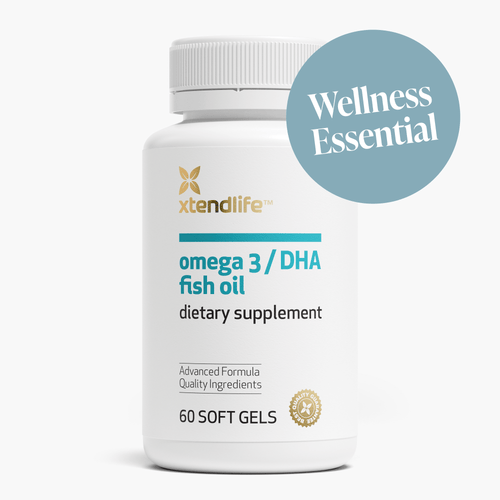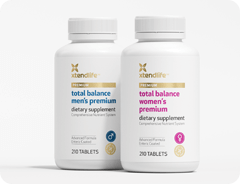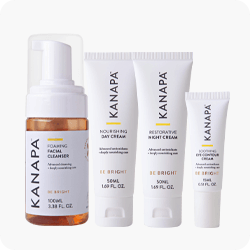
Dr. Amanda Wiggins
Xtendlife Research Scientist
Dr. Amanda Wiggins works with Xtendlife as the Chief Research Scientist, where she shares her knowledge of research, science and wellness.
What Happens to Our Brains as We Age?
Your brain is like any other organ in your body - over time it loses its youthful abilities. The processes underlying brain aging are complex and involve changes in brain structure as well as changes at the cellular level such as reduced mitochondrial activity. From a brain structure point of view, even if you're healthy, you lose up to 20% of your brain volume over time.
The process of brain aging manifests as decreased cognitive performance but may also involve changes to sensory perception and motor coordination (movement). From a day-to-day point of view, it could mean anything from inability to recall where you parked your car, to more serious problems such as being unable to recall the names of those in your family. Declining cognitive performance includes reduced abilities in learning, memory, attention, and decision-making speed.
In some cases, mild cognitive impairment progresses into serious neurodegenerative diseases such as Alzheimer's or Parkinson's disease. Sadly, the incidence of these neurodegenerative diseases is increasing and it's likely you will know someone who is affected.
In this blog, we focus on nutritional approaches to healthy brain aging. However, it almost goes without saying that good nutrition is only part of the story. Having an active lifestyle - both physically and mentally is also part of the solution to supporting your brain as you age (and your body of course!).
Nutritional Support for Healthy Brain Aging
While it is true that our brains do age, it is also true that paying attention to what you eat can slow down the process of brain aging.
Here at Xtendlife, we're not fans of fad diets. Instead, we look to credible, peer-reviewed scientific literature to support our products and our thinking. So, what does the science tell us in terms of nutrition and healthy brain aging?
Vegetables, B vitamins, berries, fish, poultry. Sounds sensible right?
Reducing your intake of sugar also makes sense; it's a factor that is proven by research to contribute to healthy brain aging.
In the notes below, we have pulled together the strongest evidence-based approach to nutrition for healthy brain aging to date.
MIND Diet
Studies published in 2015 revolutionized the thinking on dietary habits and healthy brain aging. Researchers devised a dietary scoring system, which they termed the MIND diet. MIND stands for Mediterranean-DASH Diet Intervention for Neurodegenerative Delay.
The diet is styled after the well-known Mediterranean Diet, combined with the DASH diet which is specifically aimed at reducing high blood pressure. Additionally, the MIND Diet brings modifications based on the most compelling findings in the diet-dementia field.
Proof of the benefits of the MIND diet comes from data from 960 people from 40 retirement communities. During the nine-year study, participants had an annual clinical evaluation to determine their cognitive state and completed a dietary questionnaire to determine their consumption of different foods.
There were two ground-breaking findings. The first was about the rate of cognitive decline. For those who scored highest in terms of eating according to the MIND diet, their brains were 7.5 years younger in terms of cognitive decline, compared to those who had the least adherence to the MIND diet. That is a very significant slowdown in cognitive decline!
The second ground-breaking finding was about the reduced risk of Alzheimer's Disease. Those who scored highest in terms of eating according to the MIND diet had a 53% reduction in the rate of developing Alzheimer's Disease, compared with those who had the least adherence to the MIND diet. Even those who had a moderate adherence to the MIND diet had a significant 35% reduction in Alzheimer's rate compared to those who had the least adherence to the MIND diet.
So, what exactly is the MIND diet? It is based on eating from 10 food groups, as shown below:
- Green, leafy vegetables: Aim for six or more servings per week. This includes kale, spinach, cooked greens and salads.
- All other vegetables: Eat another non-starchy vegetable in addition to the green leafy vegetables at least once a day.
- Berries: Eat berries at least twice a week.
- Nuts: Try to get five servings of nuts or more each week.
- Olive oil: Use olive oil as your main cooking oil.
- Whole grains: Aim for at least three servings daily. Choose whole grains like oatmeal, quinoa, brown rice, and whole-wheat pasta.
- Fish: Eat fish at least once a week. Choose fatty fish like salmon, sardines, or mackerel for their high amounts of omega-3 fatty acids. More on omega-3s below.
- Beans: Include beans (including lentils and soybeans) in at least four meals every week.
- Poultry: Try to eat chicken or turkey at least twice a week. Note that deep-fried chicken is not encouraged on the MIND diet.
- Wine: Aim for no more than one glass daily. Both red and white wine may benefit the brain. However, much research has focused on the red wine compound resveratrol, which may help protect against Alzheimer's disease.
Omega-3's
As well as the MIND diet study described above, many other studies have found that consumption of fish, the primary dietary source of omega-3 fatty acids, is associated with a reduced risk of cognitive decline or dementia.
DHA, but not other omega-3 fatty acids, has been confirmed as most important for brain health. DHA is the most abundant long-chain polyunsaturated fatty acid in the brain, and it is reduced in the brains of patients with Alzheimer's disease. The other major omega-3 fatty acid found in fish; EPA is virtually absent in the brain.
So how much DHA do you need for good brain health into older age? There isn't a strict consensus. However, research shows that 100mg - 200mg DHA per day is protective in supplement form, or at least one serving of oily fish per week.
In one large meta-analysis that combined the results of 21 clinical studies with over 180,000 people, a 100mg/day increase in DHA intake was associated with a 14% lower risk of dementia and a 37% lower risk of Alzheimer's disease.
The bottom line is you should consume at least one serving of oily fish per week to support healthy brain aging. In addition, consider taking a high-quality omega-3 supplement for further support.
Xtendlife’s omega-3 range contains 700mg DHA per serve and is made from New Zealand hoki fish harvested from the pristine waters of the Southern Ocean off the coast of New Zealand. It also contains pure concentrated tuna oil which is processed for the highest level of purity and concentrated to ensure high potency DHA.
Pure & Effective Omega 3
Our signature blend of bioavailable New Zealand Hoki and Tuna oil, provides full-body benefits for all ages. High in DHA (700mg per serving).
Shop now
B Vitamins and the VITACOG Study
In another ground-breaking study, researchers looked at the rate of brain atrophy (shrinkage) in those over the age of 70 who were suffering mild cognitive impairment. This is known as the VITACOG Study.
A total of 168 participants in this study were divided into two groups. One group received supplementation with folic acid, vitamin B12, and vitamin B6. The other group received a placebo. The rate of brain atrophy (shrinkage) was assessed by MRI scans over the course of two years. The rate of brain atrophy for those who received the supplements was a staggering 30% less than for those who received the placebo.
Why is this important? Accelerated brain atrophy is a hallmark of the transition from mild cognitive impairment to Alzheimer's Disease, hence supplementing with B vitamins is an excellent way of reducing the risk of developing Alzheimer's disease and supporting brain health in older age.
To ensure you get enough B vitamins, as well as eating according to the MIND diet, we recommend taking a supplement that contains the full spectrum of B vitamins.
Xtendlife's Total Balance products are all excellent options for getting your B vitamins (as well as other benefits of course!). All the products in the Total Balance range contain the full spectrum of biologically active B vitamins for optimal brain support.
Who Wants to Be “Sharp as a Tack”?
We hope that this blog has shown that with the right nutrition, it is possible to protect your brain and slow the process of brain aging. There is a lot of research about the importance of physical and mental activity for brain health too (although not enough space to cover that here).
It's never too late to make radical lifestyle changes. Start by asking yourself whether you want to be the person who is "sharp as a tack" at 90.
I'm sure for most of us, the answer is "yes!"
Coming Soon!
We wanted you to be the first to know!
Think Sharp is an exciting new product that was developed off the back of ground-breaking research. Designed by a Neuroscientist, it contains Sibelius Sage®, Huperzine A, and Bacopa Extract for a fast brain boost, and targeted nutrition in the form of B-vitamins + folate for long-term support of brain health. Stay tuned for launch details coming soon!
References
Zhang Y, Chen J, Qiu J, Li Y, Wang J, Jiao J. Intakes of fish and polyunsaturated fatty acids and mild-to-severe cognitive impairment risks: a dose-response meta-analysis of 21 cohort studies. Am J Clin Nutr 2016;103:330-40.
Morris, C.M., Tangney, C.C., Wang, T., Sacks, F.M., Bennett, D.A., and Aggarwal, N.T. MIND Diet Associated with Reduced Incidence of Alzheimer’s Disease. Alzheimers Dement. 2015 September ; 11(9): 1007–1014.
Morris, C.M., Tangney, C.C., Wang, T, Sacks, F.M., Barnes, L.L, Bennett, D.A., and Aggarwal, N.T. MIND diet slows cognitive decline with aging. Alzheimers Dement. 2015 September ; 11(9): 1015–1022.
Smith, D.A, Smith, S.M., de Jager, C.A, Whitbread, P., Johnston, C., Agacinski, G., Oulhaj, A., Bradley, K.M., Jacoby, R., Refsum, H., Homocysteine-Lowering by B Vitamins Slows the Rate of Accelerated Brain Atrophy in Mild Cognitive Impairment: A Randomized Controlled Trial. PLoS ONE 1 September 2010, Volume 5, Issue 9, e12244.
Selhub, J., Troen, A., and Rosenberg, R.I. B vitamins and the aging brain. Nutrition Reviews Vol. 68(Suppl. 2):S112–S118, 2010.
Mattson, M.P., and Arumugam, T.V. Hallmarks of Brain Aging: Adaptive and Pathological Modification by Metabolic States. Cell Metab. 2018 June 05; 27(6): 1176–1199.


 Supplements
Supplements Superfoods
Superfoods Bundles
Bundles









